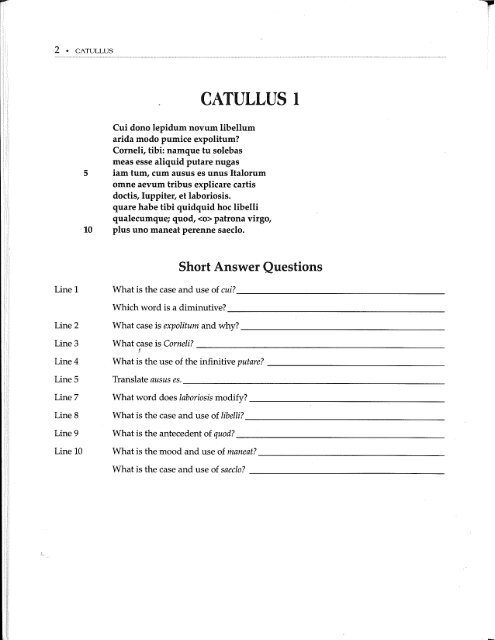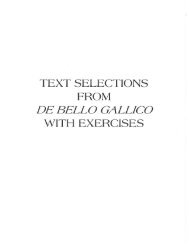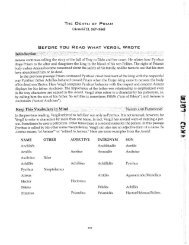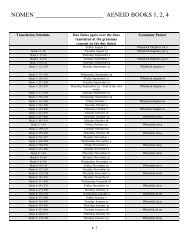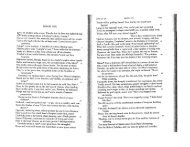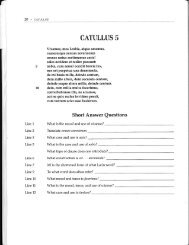CATULLUS 1
CATULLUS 1
CATULLUS 1
You also want an ePaper? Increase the reach of your titles
YUMPU automatically turns print PDFs into web optimized ePapers that Google loves.
2 . <strong>CATULLUS</strong><br />
<strong>CATULLUS</strong> 1<br />
Cui dono lepidum novum libellum<br />
arida modo pumice expolitum?<br />
Corneli, tibi: namque tu solebas<br />
meas esse aliquid putare nugas<br />
5 iam tum, cum ausus es unus Italorum<br />
omne aevum tribus explicare cartis<br />
doctis, luppiter, et laboriosis.<br />
quare habe tibi quidquid hoc libelli<br />
qualecumque; quod, patrona virgo,<br />
10 plus uno maneat perenne saeclo.<br />
Line 1 What is the case and use of cui?<br />
Which word is a diminutive?<br />
Line 2 What case is expolitum and why?.<br />
Line 3 What case is Corneli?<br />
Short Answer Questions<br />
Line 4 What is the use of the infinitive putare?<br />
Line 5 Translate ausus es.<br />
Line 7 What word does laboriosis modify?.<br />
Line 8 What is the case and use of libelli? _<br />
Line 9 What is the antecedent of quod?<br />
Line 10 What is the mood and use of maneat? _<br />
What is the case and use of saeclo?
Multiple Choice Questions Suggested time: ll minutes<br />
1. In line 1, the subject of dono refers to<br />
a. Cornelius<br />
c. a girl<br />
2. In line 1, -pumice is modified by<br />
a. cui (line 1)<br />
c. arida (line 2)<br />
3. From lines 1-4, we learn that<br />
a. Cornelius is writing a new type of book<br />
c. Cornelius believes the new book is not<br />
worthwhile<br />
4. In line 4, the subject of esse is<br />
a. tu (line 3)<br />
c. unus (line 5)<br />
5. The infinitive explicare (line 6) is complementary to<br />
b. Jupiter<br />
d. Catullus<br />
b. novum (line 1)<br />
d. modo (line 2)<br />
<strong>CATULLUS</strong> 1 • 3<br />
b. Cornelius will be sent a new type of<br />
book<br />
d. Cornelius thinks the new book is too<br />
small<br />
b. nugas (line 4)<br />
d. aevum (line 6)<br />
a. ausus es (line 5) b. cartis (line 6)<br />
c. doctis (line 7) d. hahe (line 8)<br />
6. In lines 5-7, Cornelius' writing is described as<br />
a. a history in three volumes b. a story about one Italian<br />
c. a book that teaches about Jupiter d. a tale of daring labors<br />
7 In line 7, there is an example of<br />
a. chiasmus<br />
c. metonymy<br />
8. In line 9, to whom does the virgo refer?<br />
a. Catullus' girlfriend<br />
c. a muse<br />
9. The subject of maneat (line 10) is<br />
a ^Mod (line 9)<br />
c. patrona (line 9)<br />
b. an oxymoron<br />
d. apostrophe<br />
b. Cornelius' daughter<br />
d. one of Jupiter's lovers<br />
b. virgo (line 9) •<br />
d. saeclo (line 10)
4 • <strong>CATULLUS</strong><br />
Translation Suggested time: 10 minutes<br />
Translate the passage below as literally as possible.<br />
Corneli, tibi: namque tu solebas<br />
meas esse aliquid putare nugas<br />
iam tum, cum ausus es unus Italorum<br />
omne aevum tribus explicare cartis<br />
5 doctis, luppiter, et laboriosis.<br />
* Short Essay Suggested time: 20 minutes<br />
Give two different meanings for the word expolitum in line 2 and explain how this word plays a key<br />
role in the thought of the entire poem.<br />
Support your assertions with references drawn from throughout the poem. All Latin words must be<br />
copied or their line numbers provided, AND they must be translated or paraphrased closely enough<br />
so that it is clear you understand the Latin. It is your responsibility to convince your reader that you<br />
are basing your conclusions on the Latin text and not merely on a general recollection of the passage.<br />
Direct your answer to the question; do not merely summarize the passage. Please write your essay on<br />
a separate piece of paper.<br />
Long Essay Suggested time: 30 minutes<br />
Discuss what Catullus considers to be good poetry, according to the information presented in Poem 1.<br />
Support your assertions with references drawn from throughout the poem. All Latin words must be<br />
copied or their line numbers provided, AND they must be translated or paraphrased closely enough<br />
so that it is clear you understand the Latin. It is your responsibility to convince your reader that you<br />
are basing your conclusions on the Latin text and not merely on a general recollection of the passage.<br />
Direct your answer to the question; do not merely summarize the passage. Please write your essay on<br />
a separate piece of paper.
104 • <strong>CATULLUS</strong><br />
Ilie mi par esse deo videtur,<br />
ilie, si fas est, superare divos,<br />
qui sedens adversus identidem te<br />
spectat et audit<br />
<strong>CATULLUS</strong> 51<br />
5 dulce ridentem, misero quod omnis<br />
eripit sensus mihi: nam simul te,<br />
Lesbia, aspexi, nihil est super mi<br />
lingua sed torpet, tenuis sub artus<br />
10 flamma demanat, sonitu suopte<br />
tintinant aures, gemina teguntur<br />
lumina nocte.<br />
otium, Catulle, tibi molestum est:<br />
otio exsultas nimiumque gestis:<br />
15 otium et reges prius et beatas<br />
perdidit urbes.<br />
Line 1 What is the case of mi?<br />
What is the case and use of deo?<br />
Short Answer Questions<br />
Line 2 To what verb is superare complementary?<br />
Line 3 What is the case, number, and form of sedens?<br />
Line 5 What word does ridentem modify?<br />
What word does misero modify?<br />
Line 6 What is the case and use of sensus?<br />
Line 7 What is the case and use of Lesbia?<br />
Line 9 What case is tenuis, and what word does it modify?<br />
Line 11 What word does gemina modify?<br />
Line 12 What is the case and use of nocte?
Line 14<br />
Line 15<br />
1. In line 1, mi refers to<br />
a. that man<br />
c. Catullus<br />
What is the case and use of Catulle?<br />
What is the case and use oi otium?<br />
What word does beatas modify?<br />
Multiple Choice Questions Suggested time: 8 minutes<br />
2. The antecedent of qui (line 3) is<br />
a. that man<br />
c. Catullus<br />
3. From lines 1-4, we learn that<br />
a. that man can look at you<br />
c. divine beings can conquer you<br />
4. From lines 5-7, it appears that<br />
a. Lesbia is miserable<br />
c. Catullus is overwhelmed<br />
5. Lines 9-12 contain an example of<br />
a. asyndeton<br />
c. apostrophe<br />
6. Lines 13-16 indicate that<br />
a. kings will destroy cities<br />
c. leisure is not desirable<br />
7. Which of these is not present in lines 13-16?<br />
a. polyptoton<br />
c. tricolon crescens<br />
b. you<br />
d. a god<br />
b. you<br />
d. a god<br />
b. Catullus can hear you<br />
d. the god is watching over you<br />
b. that man is laughing<br />
d. you are senseless<br />
b. hysteron proteron<br />
d. enjambment<br />
b. Catullus bothers some people<br />
d. Lesbia is being too impatient<br />
b. anaphora<br />
d. synchysis<br />
<strong>CATULLUS</strong> 51 • 105
106 • <strong>CATULLUS</strong><br />
Translation Suggested time: 6 minutes<br />
Translate the passage below as literally as possible.<br />
dulce ridentem, misero quod audit omnis<br />
eripit sensus mihi: nam simul te,<br />
Lesbia, aspexi, nihil est super mi<br />
Long Essay Suggested time: 30 minutes<br />
Discuss how references to the senses play an important role in Poem 51.<br />
Support your assertions with references drawn from throughout the poem. All Latin words must be<br />
copied or their line numbers provided, AND they must be translated or paraphrased closely enough<br />
so that it is clear you understand the Latin. It is your responsibility to convince your reader that you<br />
are basing your contlusions on the Latin text and not merely on a general recollection of the passage.<br />
Direct your answer to the question; do not merely summarize the passage. Please write your essay on<br />
a separate piece of paper.
Scan the following lines and name the meter.<br />
Scansion<br />
lingua sed torpet, tenuis sub artus<br />
flamma demanat, sonitu suopte<br />
tintinant aures, gemina teguntur<br />
lumina nocte.


